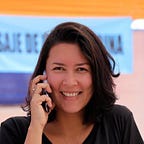Taking school meals home
After coronavirus closed schools in the Republic of Congo, the World Food Programme (WFP) and teachers got to work to ensure that children keep receiving their daily meal at home.
When the COVID-19 crisis started, 90 percent of the world’s schoolchildren were sent home. With schools shut, children missed out on their education and vital services, such as meals, nutrition and health.
In the first episode of “School feeding at home” — a podcast produced by WFP’s School Feeding Division — WFP’s Country Director in the Republic of Congo, Jean-Martin Bauer tells us about what happened when schools in the country closed and shares his concerns on how to ensure that children return to school once the emergency is over.
Tune in 👇
In the Republic of Congo, schools closed in mid-March. The Government acted quickly and ensured children kept learning from home by providing lessons through television, radio and newspapers. A key priority for the government was to not stop the learning.
However, once schools closed, millions of children were also missing access to school meals. In many cases, particularly for children of the poorest families, this meant losing the only meal of the day.
Together with the government, WFP launched a “School feeding at home” initiative. Under this initiative, more than 61,000 children in over 340 schools received the equivalent of their school meals in the form of take-home rations. Working with teachers and partners, WFP ensured social distancing and hygiene measures during the deliveries. UNICEF, for example, set up handwashing stations in the schools for children and parents to use when they came to pick up the rations.
“I visited a school, around 60 KM outside of Brazzaville, not the most remote area. The headmaster at the school told me that she hadn’t seen her schoolchildren in over a month. She told me that those kids had visibly lost weight. I think that is an indication of how important these meals are for children. Without the school meal these children go hungry. And the fact that we were able to resume the distribution through schools, even though it was not a meal at school but a meal at home made quite a difference.”
Jean-Martin Bauer, WFP Country Director in the Republic of Congo
Schools are expected to open again in September and WFP’s main concern is to ensure that children return to the classroom and resume their education. However, the economic consequences of the crisis in Congo are dramatic and thus many children might run the risk of never returning to school.
School feeding can be a great incentive to support families so that children get back to school and get an education. WFP will also strengthen the purchase of food from local farmers for the school feeding programme supporting the local economy.
As soon as school re-open children will receive Mbala Pinda, a delicious and nutritious snack made with cassava & peanuts. This snack is 100 percent locally produced and its distribution will not only ensure children receive a nutritional boost but also encourage local economy.
As the lead UN agency supporting governments with school feeding programmes, WFP will continue bringing you stories on how countries are finding ways to keep school children healthy, safe and ready to learn. Stay tuned for more.
